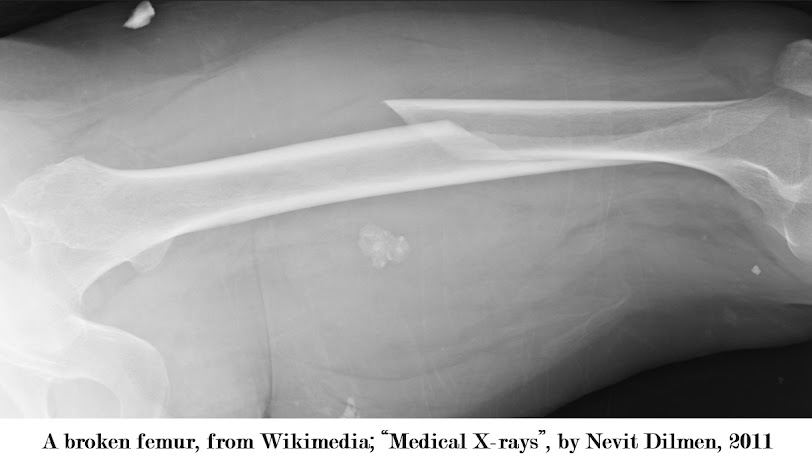Hey,
wait, the picture above doesn’t have anything to do with broken femurs! What gives?
Yep, you’re right. What it means, is that I have been sick all week and just didn’t have in me to research a full article, so this week I amcalling in some help from Tech. Sgt. Charles Arnold of the United States Air Force.
A
fall from a great height or a high-speed car collision can result in a femoral
shaft fracture, which is a severe injury.
A fractured femur, also known as a thighbone, is a bad break that
requires serious and immediate attention.
Compounding
all of this is that a broken femur can present in several different ways, the
bone could be displaced or not, and could be “open” (compound), where the bone
has ripped through the skin and muscle and is sticking out or “closed” (simple)
with no exterior wound.
So,
with the weather worsening, what do you do?
According to Tech. Sgt. Charles Arnold of the United States Air Force, your best alternative is choice D), begin first aid and stabilize your friend, and then prepare for a short stay in the wilderness, and once the snow stops falling you can think about signaling for help.
· Move
the victim as little as possible during first aid.
· Stopping
the Bleeding is the number one priority, stop the bleeding and clean and
bandage the wound.
· If
the bone is sticking out through the skin, the limb is visibly deformed, or you
can hear or feel grating, then you know the bone is broken. If the limb is too painful for the victim to
move it or use it, then assume the bone is broken.
· Splints
are like an exoskeleton and immobilize and hold a broken limb in place. Broken limbs swell, so don’t forget
padding.
· For
open fractures, where bone is sticking out, apply pressure to stop the
bleeding, rinse the bone with lots of sterile water. Don’t scrub the wound, touch it or bandage
the bone or wound. Reduce the fracture as
best as you can with traction. Cover the
open wounds and splint the limb.
· For
fractured limbs that have reduced CSM (circulation, sensation, or movement),
traction can improve the circulation and reduce pain.
· In
wilderness medicine, traction splints are usually make-shift devices that are “MacGyvered”
out of whatever is available.
However,
Justin Hensley MD, wrote that if you are unable to improvise a traction splint,
then simply splinting the limb in its current position to immobilize it, will
also work.
Hopefully,
you will never have to deal with a fractured femur, however since it could happen,
you need to be prepared. Get advanced
first aid training BEFORE you go into the wilderness!
I
hope that you continue to enjoy The Woodsman’s Journal Online and look for me
on YouTube at BandanaMan Productions for other related videos, HERE. Don’t forget to follow me on both The
Woodsman’s Journal Online, HERE,
and subscribe to BandanaMan Productions on YouTube. If you have questions, as always, feel free
to leave a comment on either site. I
announce new articles on Facebook at Eric Reynolds, on Instagram at
bandanamanaproductions, and on VK at Eric Reynolds, so watch for me.
That
is all for now, and as always, until next time, Happy Trails!
Sources
Arnold, Charles, T.
Sgt.; “Could You Survive”, Spokane Daily Chronicle, March 8, 1977, p 17,
https://books.google.com/books?id=4vlLAAAAIBAJ&pg=PA35&dq=%22spokane+daily+chronicle%22+%22could+you+survive%22&article_id=3378,2133001&hl=en&sa=X&ved=2ahUKEwipqYve8qmFAxWtEFkFHQMiA2I4ChDoAXoECAkQAg#v=onepage&q&f=false, accessed April 4, 2024
Behnke, Nicole Kellan,
MD, Orthopaedic Surgery, “Principles of limb immobilization: backcountry
applications”, August 19, 2022, https://www.ohsu.edu/sites/default/files/2022-08/OM22-4-Behnke.pdf, accessed April 5, 2024
Hensley, Justin, MD;
“Femoral traction splints, helpful or not?”, November 3, 2020, [© 2024 LITFL], https://litfl.com/femoral-traction-splints-helpful-or-not/,
accessed April 5. 2024
Vuković , Diane; “How to
Set and Splint a Broken Bone in the Wilderness (with Pictures)”, [© 2024 Primal Survivor], https://www.primalsurvivor.net/broke
n-bone-wilderness/, accessed April 5, 2024
Wikimedia; “Medical
X-rays”, by Nevit Dilmen, 2011, https://commons.wikimedia.org/wiki/File:Medical_X-Ray_imaging_IYN05_nevit.jpg,
accessed April 5, 2024
Wikipedia, “Open fracture”,
by Saltanat, August 28, 2008, https://commons.wikimedia.org/wiki/File:Open_fracture_01.JPG,
accessed April 6, 2024











No comments:
Post a Comment